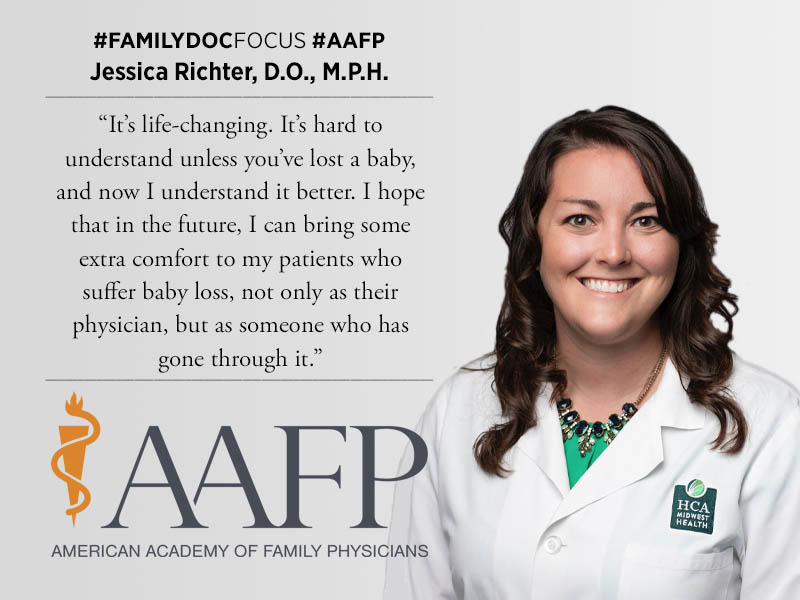Turning Loss Into an Opportunity to Help Others
January 5, 2021, 11:43 am David Mitchell — Jessica Richter, D.O., M.P.H., spent Black Friday online, taking advantage of sales on things like car seats and Pack 'n Plays. Although Richter had been expecting the birth of her first child in late October, she was shopping for her patients.

“Our son died two days before I was supposed to be induced, so we had everything,” said Richter, whose son Ben was stillborn on Oct. 25. “We had boxes and boxes of diapers and wipes. It felt like a waste to keep it in his room. Four or five days after Ben died, I was sitting with my mother and mother-in-law, lamenting what to do with all this stuff, and my mom said, ‘Can you donate it to your patients?’ I mustered the courage to go through his stuff. That’s how this started.”
At Richter’s first job after residency, a family medicine practice in Kansas City, Mo., obstetrics patients in need were given car seats at their prenatal appointments, and new mothers also were given diaper bags packed with helpful items at their first follow-up appointments in clinic.
“It was an incentive to bring babies in for their first appointments,” said Richter, a full-scope family physician who delivers three to five babies a month. “That’s a really important visit. Moms liked the diaper bags. I wanted to do something like that.”
As Richter pondered what to do with dozens of pairs of baby socks and other infant items in her nursery, people were reaching out to her and her husband and asking where they could make donations in Ben’s name. A GoFundMe account was established, and more than $20,000 was donated in the first month.
Richter hopes to make Ben’s Closet a sustainable charity that can help families beyond her own patient panel.
“There is need in the whole city,” said Richter, a National Health Service Corps scholar who splits her time between a federally qualified health center in Kansas City, Mo., and a family medicine practice in Overland Park, Kan. “We have family and friends who have committed to making annual donations. It’s been amazing. We’ve raised so much money. We’re going to be able to do this for a long time.”
For now, Richter’s nursery is still loaded with supplies. She plans to have a diaper-bag-packing event (and wine night) with colleagues from her residency program at the University of Missouri-Kansas City after they have all received the COVID-19 vaccine.
“That will be helpful for me,” she said. “It’s been difficult. I do it in spurts.”
In addition to diapers and wipes, Richter has thermometers, bulb syringes and blankets waiting to be packed. Her mother-in-law has channeled her own grief into making burp cloths and bibs to go in the diaper bags.
“It’s been traumatic,” Richter said. “It’s the great tragedy of our lives, but this gives us hope that some good can come out of it. And I’ll be able to see the fruits of this with my own patients.”
Richter isn't giving away all of her son’s things. The couple, who had struggled with infertility before this pregnancy and had considered adoption, hopes to try again.
“Everyone has rallied around us to help us through this,” she said. “It’s not the best situation to do something like, this but it provided an opportunity for us to help others.”
Richter, who is vice president of the Missouri Society of the American College of Osteopathic Family Physicians and Missouri delegate to the ACOFP House of Delegates, said the experience will make her a better physician. In a little more than two months, she’s read roughly a dozen books on coping with loss.
“It’s changed my views and approach,” she said. “It’s life-changing. It’s hard to understand unless you’ve lost a baby, and now I understand it better. I hope that in the future, I can bring some extra comfort to my patients who suffer baby loss, not only as their physician, but as someone who has gone through it.”